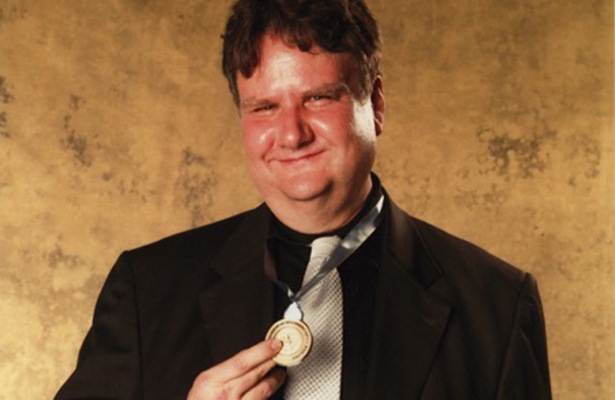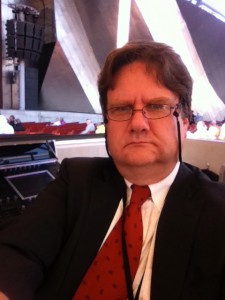This article is part of a series centered around the members and work of the Northwestern University Cello Ensemble.
In Part 1 of this interview, Hans Jensen speaks with four-time Grammy-winning recording engineer Christopher Willis, who recorded the Northwestern University Cello Ensemble’s upcoming CD Shadow, Echo, Memory. Mr. Willis talks about what sparked his interest in recording, his role models, and how recording has changed over his career.
*** Support the NU Cello Ensemble by pre-ordering their album – Shadow, Echo, Memory***

Hans Jensen: How did you get into recording?
Christopher Willis: Well, my father [Thomas Willis] used to bring records home by the score, and as a music critic, he got them all, so we had thousands. I mean, there was a point where you would trip over them in the living room, most of them unwrapped, unplayed. So I did take an interest in just sort of going through, browsing through them and listening to things, first sort of random, and then I developed a taste for different things. and I got to appreciate some of the different styles of recording that different labels would do.
Of course this is way before digital, and I got interested in tape recorders probably because my father had a lot of stuff that he used to do both at our church but also at Northwestern that involved tape recorders and slides. So there would be tape recorders in the house and I would start playing around. I used to do mock sports broadcasts with my 8-year-old buddy. Then in my early teens, I started recording some of the LPs and making collages, playing DJ, overdubbing things.
By the time I was in high school my whole bedroom was full of more recording stuff that I got hold of. There were some analog synthesizers involved with that. That was a lot of fun.
Hans Jensen: When you started out as a kid, did you read a lot about it?
Christopher Willis: I wouldn’t say so. Liner notes and session info, yes. I mean, recording classical music is kind of a different thing. Of course, most of what’s out there today in the way of educational material is geared toward the more popular kind of music and front-of-house live mixing because that’s where the money is. There is certainly a technical side to explore, but you need experience. What you need to do is be an apprentice, not a student. You can study cooking, woodworking, even music, but it won’t make you good at any of those things without doing it. I would say it’s helpful to understand certain psycho-acoustic and electrical principles, however.
Classical recording is pretty basic in terms of technique, you just need really expensive equipment and try to get a refined and accurate sound. That’s sort of a different thing and harder to get into for someone starting out just financially.
Hans Jensen: Did you have a role model for your recording?

Christopher Willis: Yes, well, actually a couple of them. One of them was the pastor of our church. This was in the sixties, and he was into multimedia quite a bit. He had the whole church wired for sound, so we would play back all this stuff, and there was no pipe organ — we had a Farfisa electronic pop organ that my father would play for the services.
It was really trendy and “far out”, and my father, who was the organist there, was into that kind of “youth outreach”. So I got involved with doing recorded things, presentations as part of the services, and then we used the synthesizers live sometimes and there were often slide shows.
Then, another fellow I met at that same church, Lou Everett, was a professional in recording. He was my first true recording mentor. He used to go and do high school choir recordings and he’d cover the whole Midwest. He would make Christmas albums with the kids from the choir. He made a living doing that for 40 years. I started working with him when I was 19 and I worked with him off and on for 20 years.
What was fascinating to me about that gig was to go around to all these different churches. He would choose really acoustically fine churches with a really huge sound… very live acoustics with a proper pipe organ and so on, The choir would sing Christmas carols, which were usually not that difficult, but they could really make a fine job of it, you know, and the parents would go crazy for these recordings.
Hans Jensen: Did you have to do a lot to manipulate the sound in such a big space?
Christopher Willis: Well, there wasn’t much we could do. Basically it was a matter of choosing the right microphones and the right techniques, but we were just recording in analog stereo. It was very professional but it was still fairly basic. We needed some special hardware such as very tall stands, etc. and we favored ribbon microphones, which are making a big comeback today.
Hans Jensen: How do you know where to place the mics in a particular space?
Christopher Willis: Well, it’s sort of like cooking. If you do it a lot you just sort of naturally know what you want to do, I guess.
Of course, you experiment a little bit. And there’s a little fudge factor in everything. You say, “Well, this turned out this way the last time,” and you might shift things around a little bit just to try to improve, based on your experience with the last time.
Hans Jensen: Back then did producing an LP require a lot of editing?
Christopher Willis: Well, we would do it with a razorblade.
Hans Jensen: So then it was cut and spliced?
Christopher Willis: Of course, yeah. I got very good at that. I sort of miss that somehow.
We didn’t edit a whole lot. I would say maybe three or four edits per song for the choirs, mainly for different verses. but we recorded a lot of takes and tried to realize their full potential.
Hans Jensen: How did you transition from choirs to instrumental recordings?
Christopher Willis: Well, that came gradually. I came back to Chicago and I hooked up with a guy that I knew from Northwestern back when I went to school here, Vic Muenzer is his name. He was the guy who got me into digital.
Vic started a company called Classic Digital, and this was in the late ‘80s and early ‘90s. He and Larry Rock, who was at WFMT, wanted to start using digital. So after we got to know each other we invested in some early CD editing equipment. There was a big push at the time in the ‘90s to remaster CDs, not just to record new things but to take all of the recordings that had been on LP and reissue them on CD. There was actually a lot of business for us just because we were able to do that.
Hans Jensen: Yeah, but it didn’t sound so good.
Christopher Willis: No, it didn’t. At the time, digital was still pretty primitive and it didn’t really sound as good as the best analog. Anyway, that’s when we also got into recording directly to digital for the first time. We started recording digitally in stereo. and we had a recording we did like that make the Classical Top 40, I was the assistant to Larry — he was a mentor, definitely. He went on to record the New York Philharmonic broadcasts.
Hans Jensen: So how do you think the recording business has changed from the past to today?
Christopher Willis: Well, of course, the precision of the editing is, I’d say, the big difference. Nowadays, almost everything I record is multiple tracks and I almost always — well, really always — do some amount of post-production where I remix what I did in the field. At home I can make better critical decisions about the mix.
Hans Jensen: Is it also because you’re used to listening from that perspective?
Christopher Willis: Yes, exactly, and I have better tools for post-production at home. Recording in the field is really just a starting point. Then I take it home and edit as I mix. I can do that pretty efficiently, which I need to be for broadcasting. You have to be pretty direct in your approach for a broadcast. Broadcasts have firm due dates so you can’t mess around too much.
Hans Jensen: When you record with the Lyric Opera of Chicago, do you take several performances and put it together?
Christopher Willis: Yes. Well, except the local opening night broadcast is always live, so there’s no possibility. But we syndicate nationally in the summer, and those are edited from at least two performances.
Hans Jensen: Do you do the editing alone?
Christopher Willis: I have some help now from the dramaturg at Lyric, Roger Pines. He listens to my edit as a sort of final check. He generally finds a few things that we can improve, and then it’s done. But I do the initial edit and mix.
Hans Jensen: If you have an opera that is three or four hours long, are you already editing as you listen?
Christopher Willis: Well, I have general notes about what was the strongest performance. And even when you’re listening in the moment, you pretty much know when somebody’s on their game or not. So you’ll start with a base take and then you use the other ones to fill in the occasional problems that arise.
Hans Jensen: When you’re doing an opera, would you take mostly one act or sometimes even one aria from one performance?
Christopher Willis: Possibly. Sometimes with the opera it comes down to this character is doing his/her best and this character is not so you may need to switch back and forth just based on who’s singing at the time.
And then other times, if you have a new work such as the premiere we did of Bel Canto this season, the music is very hard to play. We recorded several extra performances and the later performances improved the results substantially.
Hans Jensen: Are there some conductors that are more involved or do most not care really which performances you use?
Christopher Willis: I don’t think I’ve ever had a conductor directly involve themselves in the editing process. Sometimes a musician will do a solo project or concerto and want to hear the edit and I will work with them. This is really the job of a producer, however. Production for broadcasts and smaller projects comes to me by default, often, but it is not my preferred role. A good producer understands engineers as well as the music and the musicians. It’s easier to all stay friends that way.
Stay tuned for Part 2 of this interview, where Christopher Willis discusses the equipment and techniques he used to record the Northwestern University Cello Ensemble’s upcoming CD Shadow, Echo, Memory, which will be released by Sono Luminus on July 29. Please enjoy this sneak peek below, and be sure to become a fan on Facebook and follow them on Twitter.














No comments yet.